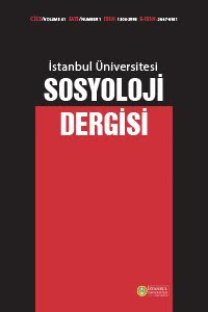Ekonomi Teorisi ile İlişkisi İçinde Bourdieu: Bir Komprador mu, Bir Eleştirmen mi?
Pierre Bourdieu'nün neo-klasik ekonomi teorisi ile ilişkisi özellikle neo-liberal dönüşüm sürecinin belirli bir evresinde gündeme gelerek tartışılmaya başlandı. Aynı dönemde Bourdieu tarafından geliştirilmiş “habitus”, “alan” ve “farklı sermaye türleri” kavramlarına dayanan analiz çerçevesinin, neo-klasik teorinin bir uzantısı mı, yoksa bizzat bir eleştirisi mi olduğu konusunda sosyal bilimciler farklı görüşler ileri sürdürdüler. Kimisi onu “ekonomi emperyalizmi”nin sosyoloji disiplini içindeki temsilcilerinden biri olarak değerlendirdi, kimileri de onun eserinin neo-klasik teoriye muhalif bir “karşı hegemonya projesi” olarak okunması gerektiğini dile getirdi. Bourdieu'nün 1950'lerin sonu ve 1960'ların başında yaptığı “Cezayir” ve “Banka ve Mudileri” ile 1980 sonrasında yürüttüğü “Müstakil Konut Piyasası” araştırmalarını esas alan bu makalede ise tartışmanın lehteki ve aleyhteki taraflarından farklı olarak, meseleyi tarihsel-toplumsal bağlamına yerleştirerek değerlendirmeyi öneren bir yaklaşım sergilenmektedir. Bu yaklaşım ışığında, onun sosyolojik teorisinin neo-klasik ekonomi teorisi ile ortak temel aksiyomlara sahip olduğu eleştirisinin büsbütün haksız olmadığı söylenmekte, ancak bu aksiyomatik ortaklığın, Bourdieu'nün teorisinin eleştirellik özelliğini azaltmak bir yana güçlendirdiği savunulmaktadır.
Anahtar Kelimeler:
Bourdieu Sosyolojisi, Ekonomi Sosyolojisi, Ekonomik Alan, Ekonominin Toplumsal Yapıları, Neo-Klasik Ekonomi Teorisi Eleştirisi
Bourdieu in his Relation to the Economic Theory: A Comprador or a Critic?
The debate on Bourdieu's relationship with neoclassical economic theory has become more apparent especially with the advancement of the neoliberalization process. In this debate, the question was whether the conceptual framework developed by Bourdieu (which is based on the notions of “habitus”, “field” and “different types of capital”) consisted of a simple extension of the neo-classical economic theory in social theory or rather a radical critique of it. Thus, some saw him as one of the representatives of “economic imperialism” in the discipline of sociology; while others considered his work as a “counterhegemonic project” against the neoclassical theory. Unlike the majority of favorable and unfavorable parts of the debate, in this article, it is proposed to consider the same issue by situating it in its historical and social context. In order to do this, we refer mainly to the Bourdieu's anthropological field studies on Algeria and on “the bank and its customers” in the late 1950s and early 1960s and also to his empirical exploration about the commercialization of individual house market during the 1980s. As a result, we would like to present that Bourdieu's approach not only shares its epistemological framework with neoclassical theory, but that this affinity in no way decreases its capacity of criticism, but rather, enhances it.
Keywords:
Sociology of Bourdieu, Economic Sociology, Economic Field, The Social Structures of the Economy, Criticism of Neoclassical Economic Theory,
___
- Althusser, L. (1962). Contradiction et surdétermination (Notes pour une recher- che). La Pensée, 106, 3-22
- Becker, G. (1971). The economics of discrimination. Chicago: University of Chicago Press.
- Becker, G. S. (1981). A treatise on the family. Cambridge, Mass.: Harvard Uni- versity Press
- Bourdieu, P. (1961). Sociologie de l’Algérie, Paris: PUF.
- Bourdieu, P. (1977). Algérie 60 – Structures économiques et structures temporelles, Paris: Ed. Minuit.
- Bourdieu, P. (1980). Questions de sociologie, Paris: Ed. Minuit.
- Bourdieu, P. (1997). Le champ économique. Actes de la Recherche en Sciences So- ciales, 119, 48-66.
- Bourdieu, P. (2000). Les structures sociales de l’économie, Paris: Seuil.
- Bourdieu, P., Darbel, A., Rivet, J.-P. ve Seibel, C. (1963). Travail et travailleurs en Algérie, Paris: Ed. Mouton.
- Bourdieu, P., Boltanski, L. ve Chamboredon, J-C. (1963). La banque et sa clientèle: Elements d’une sociologie du crédit. (Pierre Bourdieu yönetiminde Luc Boltanski ve Je- an-Claude Chamboredon tarafından yürütülmüş araştırma). Yayımlanmamış Metin. Paris: Centre de Sociologie Européenne.
- Bourdieu, P. ve Sayad, A. (1964). Le déracinement. La crise de l’agriculture traditi- onnelle en Algérie, Paris: Minuit.
- Boyer, R. (2003). L’anthropologie de Pierre Bourdieu. Actes de la Recherche en Sciences Sociales, 150, 65-78.
- Caillé, A. (1981). La sociologie de l’intérêt est-il intérresante? Sociologie du travail, 22(3), 257-274.
- Favereau, O. (2001). L’économie du sociologue ou penser (l’orthodoxie) à partir de Pierre Bourdieu. B. Lahire (Ed.), Le travail sociologique de Pierre Bourdieu- Dettes et critiques içinde (s. 255-314), Paris: La découverte & Syros.
- Fourcade, M. ve Healy K. (2007). Moral views of market society. Annual Review of Sociology, 33, 285-311.
- Göker, E. (2007). “Ekonomik indirgemeci” mi dediniz?. G. Çeğin, E. Göker ve A. Arlı (Ed.) Ocak ve Zanaat: Pierre Bourdieu Derlemesi içinde (s. 277-302). İstanbul:
- ISSN: 1304-2998
- Başlangıç: 2020
- Yayıncı: İstanbul Üniv. Edebiyat Fak. Sosyoloji Böl.
